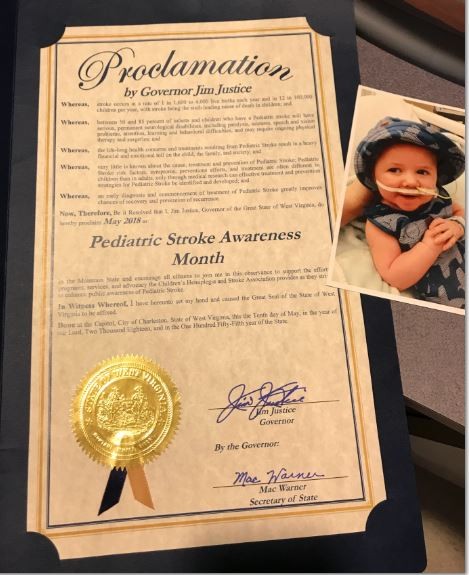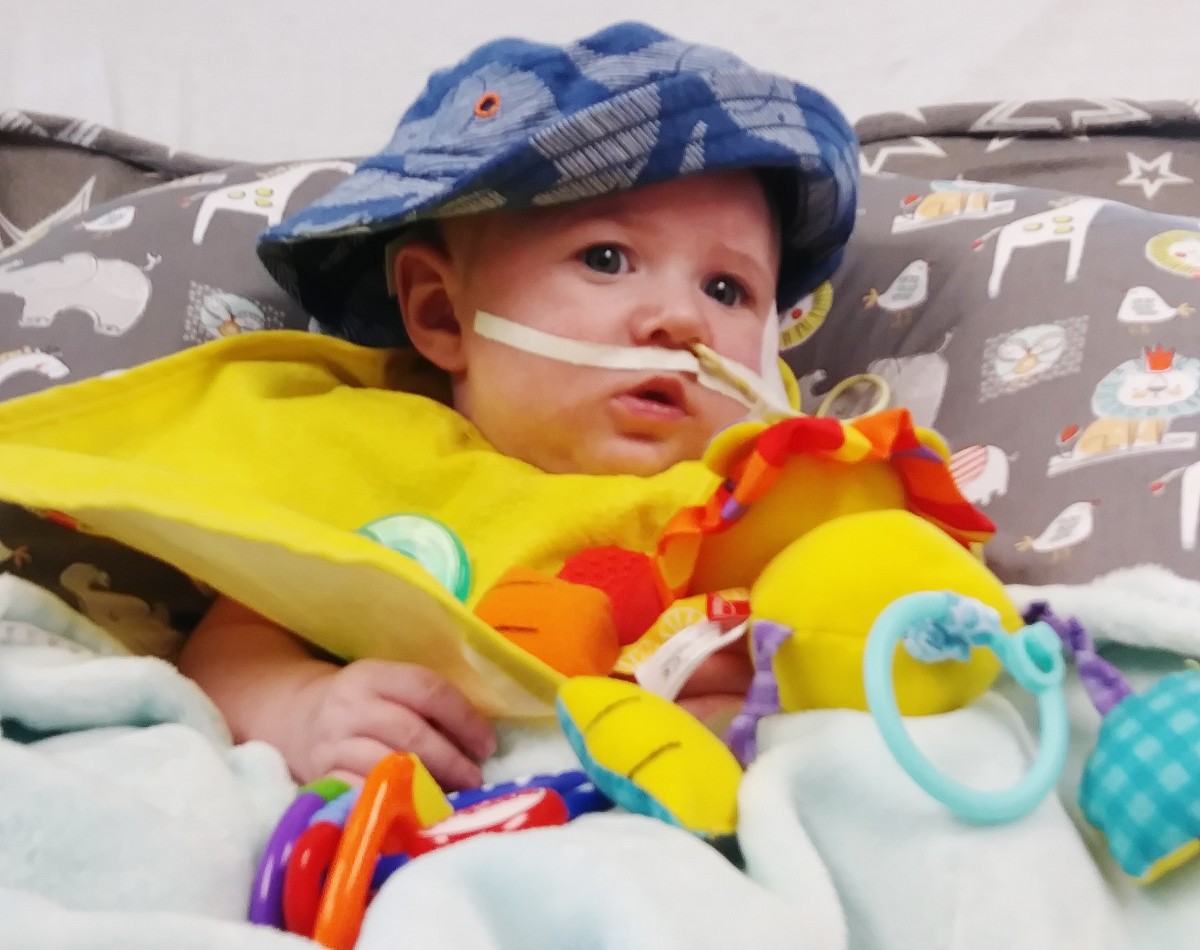By Tiffany Morgan, The Dominion Post
MORGANTOWN — Smart. Happy. Cheery.
Carrie Rial said these are the words that, to her, hold the meaning of her son’s name, Kingsley.
On Nov. 28, Kingsley Azrael Wells was born, and immediately after, panic set in. Doctors instantly noticed that Kingsley was missing skin on his head. He had an open sore and started to turn blue; his pulmonary valve had been blocked off, and was not getting the oxygen he needed.
From Parkersburg to Morgantown Kingsley went, and there he’s stayed for six months at WVU Medicine Children’s.
He was diagnosed with Adams Oliver syndrome (AOS), a rare genetic disorder that causes abnormality in skin development, including webbed feet, which is one trait Kingsley was born with.
Kingsley was also diagnosed with tetralogy of fallot with pulmonary atresia (TOF), a heart condition that leaves the patient with five heart abnormalities. Not quite 6 months, Kinsley has faced four surgeries to fix his heart.
“Kingsley has a rare combination of congenital abnormalities, one of which affects his heart. As a result of his complex congenital cardiac defect, he has required a high level of care in the Pediatric Intensive Care Unit,” said Dr. Fawwaz Shaw, pediatric cardiothoracic surgeon at WVU Medicine Children’s, and one of Kingsley’s doctors.
Cerebral venous sinus thrombosis (CVST) is another condition Kinsley developed in his young life. CVST occurs when a blood clot forms in the brain’s arteries, preventing blood to properly drain from the brain. For this condition, a conduit was put in to help Kingsley breathe. He also has stents in his pulmonary arteries to help move oxygen throughout his body.
After his fourth heart surgery, Kingsley had an ischemic stroke, which can be caused by his CVST.
Kingsley had gone into cardiac arrest with his chest still open from the surgery. Shaw performed CPR by squeezing Kinsley’s bare heart, saving his life.
“Dr. Shaw stayed after every one of his surgeries — he didn’t even leave his room,” Rial said. “Dr. Shaw is a perfectionist when it comes to his babies. I couldn’t ask for a better person to be taking care of my son.”
Shaw said Kingsley is in the right place to get the treatment he needs.
“Kingsley had an abnormal heart rhythm after his most recent surgery that resulted in him requiring chest compressions. He had return of his normal heart rhythm and other vital signs with the administration of medicines and chest compressions. Due to the proximity of his surgery, he was able to have chest compressions performed directly on his heart,” Shaw said.
“Since then, Kingsley has continued to progress well and will hopefully be able to go home soon. He will require additional surgeries over the course of his lifetime to replace certain parts of his cardiac reconstruction as he outgrows these.”
Rial said Kingsley’s stroke shocked her because she did not know babies could have one.
“I’m an EMT and I never thought babies this little had strokes. It happens … it’s not fair, but it happens,” Rial said.
After Kingsley’s stroke, his mom contacted Gov. Jim Justice, asking him to officially declare Pediatric Stroke Awareness Month in West Virginia, to raise awareness of the issue. She’s also made sure “on every telephone pole in Sistersville” there are purple ribbons for Kingsley and to raise awareness.

Kingsley was in the routine of getting two shots per day of LOVENOX, a blood thinner, for the blood clot in his brain, and each day when it was time for his shots, Rial said Kingsley would cry. Recently, he had a device inserted into his leg for the blood thinner, which he gets every three days. Rial said he “didn’t cry at all” during the procedure. He’s the first patient at WVU Medicine Children’s to have the device.
Kingsley’s most recent surgery was Monday, with doctors inserting a gastronomy tube (G-tube) for feeding. His stroke caused some setbacks in his development, including consuming food via his mouth.
Before Kingsley’s stroke, Rial said he had enjoyed his bottle, but since then, has lost knowledge on how to take it, but she is hopeful that he’ll regain the skill with time.
“His favorite thing to do before his stroke was (have) his bottle. He loved his bottle,” Rial said. “He’ll get it, though, I know he will.”
The G-tube and LOVENAX device will allow Rial to take her son home soon and although she is ready, she’s also worried about leaving the hospital, since she lives two hours away in Sistersville, in Tyler County.
“I’m more than happy to go home, I want to go home … but I’m nervous because there’s just so much … or you’re thinking about the ‘what ifs’ in your head,” Rial said.
Rial’s 4-year old daughter, Luella, has visited her little brother, but Rial has struggled with going back home and commuting to the hospital. Since she does not get to see her daughter as often as she likes, she said that every time she goes home, Luella always asks to come see Kingsley.
“She wants him to come home. She tells me that every time she sees me. Or when I’m leaving, she’ll want to go with me because she ‘wants to go to the doctors to see Kingsley,’ ” Rial said.
Rial said the biggest message she “hears at least once a day” at the hospital is how strong the babies are.
“Their favorite words at this hospital are ‘babies are resilient’ — they say that all the time,” Rial said.
Rial has found Kingsley also means strong.
“Kingsley has proved himself over and over and over. He’s given us all a scare many times, and he always comes out on top,” she said. “He’s a strong little guy — he’s my superhero. He’s a real superhero.”




